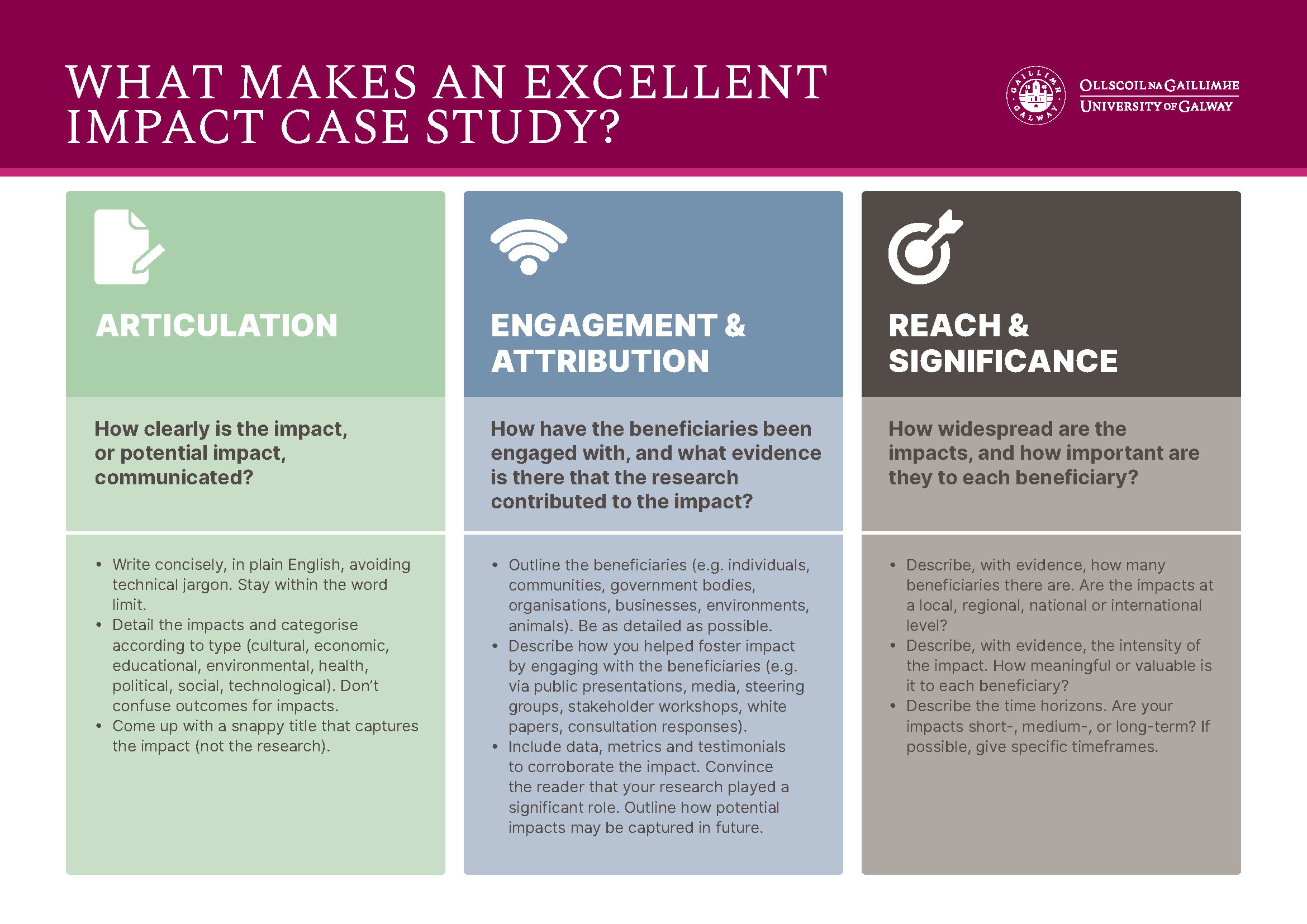COMMUNICATE

When crafting an impact section for a funding proposal, you're required to forecast the future impact of your work and outline a pathway towards it. If you're writing an impact case study, you'll compile evidence to narrate a compelling story about the impact of your work. These are two very different tasks. The tools and resources provided on this page will assist you in articulating the impact convincingly, no matter where you are on your research journey.
In either case, it's essential that your writing is accessible and inclusive. Therefore, utilising simple, easy-to-understand language is advisable. Delve deeper into this topic with the guide provided by the Plain English Campaign. For more general tips on research communication, visit our Research Community Portal, Communicate Your Research section, and consult our internal site for Guides and Support for Communicating Your Research.
What is impact?
Before you can write an impact section of a funding proposal or an impact case study, it's essential to understand what it is. Our introductory page provides definitions, describes the various types of impact that research can have, and explains why it’s in your interest to consider impact. Read more >
How to write an effective impact section
Learn what makes a compelling impact section in a funding proposal. Incorporate meaningful impact planning and give yourself the best chance of being funded.
The guide below shows you how to turn your impact planning into a compelling impact section in a funding proposal. Click here to download the guide as a PDF booklet.
Writing an impact case study
Find out what makes a good impact case study: read our guide on writing one, familiarise yourself with our case study template, and take a look at some examples.
What makes an excellent case study?
The image below illustrates what we, at University of Galway, consider essential for a high-quality case study. These three criteria are also utilised to evaluate and cultivate research impact case studies at our institution.
Tips for writing your own case study
The tips in this infographic will help you tell a compelling story that celebrates the societal impact of your work. Click here to download the guide as a PDF booklet.
Case study examples
One of the best ways to learn how to write a case study is to read others:
- University of Galway Case Studies – Examine samples of case studies authored by researchers at the University of Galway, utilising the provided template.
- UK REF Case Studies – Access a database comprising of thousands of impact case studies from the 2014 and 2021 Research Excellence Framework (REF). Utilise the search function or filter by Research Subject Area to locate case studies relevant to your field. For the highest-rated (4*) case studies, refer to this webpage for an extended list of 4* case studies from REF 2021.
- Australian Research Council Case Studies – Explore a searchable database containing case studies from a national research assessment exercise.
- University College Dublin Case Studies - Review a selection of case studies contributed by researchers at UCD.
- University of Limerick Case Studies – Sort through this collection of case studies by QS Ranking Subject Areas and relevant UN Sustainable Development Goals (SDGs).
Our Nine Part Series, 'Reflections of Research Impact', is intended to give you a quick, easy to digest introduction to research impact. Episode 7. below offers some guidance on writing an impact case study.
Training opportunities
At University of Galway, we offer various workshops and seminars on communicating your impact:
- Dr. Tamika Heiden, the Founder of the Research Impact Academy, presented a recorded workshop for University of Galway titled "Planning for and Communicating Prospective Research Impact", accessible here. Dr. Heiden is renowned for her world-leading research translation and impact services, providing you with cutting-edge skills and expertise
- Prof. Mark Reed, CEO of Fast Track Impact, presented a recorded workshop for University of Galway titled "Digital Academic", available here. This course provides a unique chance to evaluate your digital profile, explore strategies for boosting visibility and credibility in your research, and drive online impact. It critically assesses the strengths and weaknesses of different online platforms and social media, empowering you to enhance your online effectiveness and influence.
- Our Research Impact Seminar Series provides a platform to hear from national and international research impact experts. They will share and discuss best practices on impact-related topics from around the world.
For information on additional workshops and seminars, please visit our SharePoint site.
Click here to proceed to the Monitor section
Explore our toolkit to learn how to Plan, Capture, Communicate and Monitor your impact.
To enhance this toolkit, please contribute by sharing tools and other valuable resources you find useful. Kindly email Áine Mhic Thaidhg, Research Impact Officer.
The development of this toolkit was led by UCD, with funding from the HEA, and members of a Research Impact Working Group. Further information available here.

